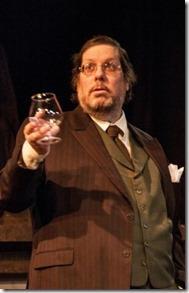
The Haunting of Hill House
Adapted and Directed by Paul Edwards
from the novel by Shirley Jackson
at City Lit Theater, 1020 W. Bryn Mawr (map)
thru May 11 | tickets: $25-$29 | more info
Check for half-price tickets
Read review
Turn up the psychological terror, tone down the unintended camp
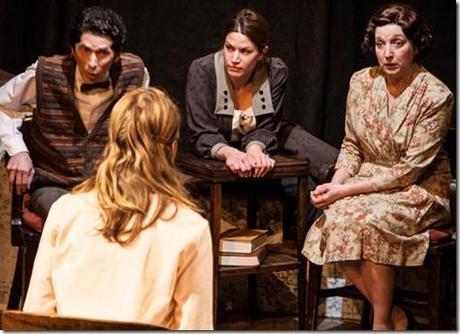
City Lit Theater presents
The Haunting of Hill House
Review by Catey Sullivan
Shirley Jackson‘s "The Haunting of Hill House" has to be one of the most terrifying novels ever penned. The plot doesn’t sound particularly original: A paranormal investigator and three game volunteers convene at a supposedly haunted house in hopes of stirring up some spirits. What starts as a lark rapidly turns nightmarish as the unseen forces within Hill House begin to mess with the minds of the intrepid ghost hunters.
Within that inauspicious framework, Jackson weaves a psychological thriller that taps into the deepest fears of sentient beings. As terror creeps in and sanity crumbles, the house begins to consume its inhabitants, warping their minds and sending shocks through their bodies in an ever-increasing maelstrom of things that go bump in the night and leave blood in their wake. In the end – well, it wouldn’t do to divulge the
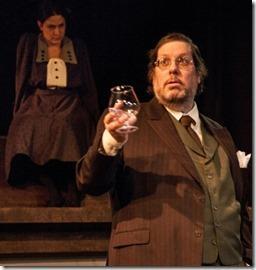
In City Lit’s staging of Jackson’s chilling story, adaptor/director Paul Edwards captures some, but not nearly enough, of the sinister atmosphere that makes the book so deliciously menacing. Working with a cast of eight, Edwards – perhaps unintentionally – brings a campy sensibility to the tale that significantly undercuts its blood-curdling power.
Classic lines from the book – “Whatever walked there, walked alone,” “People leave this town. They don’t come here” – all too often take on a B-movie cheesiness that diminishes if not outright destroys the looming, ever-increasing sense of dread that informs the novel. Still, there are some genuinely unsettling moments, many of them thanks to Edwards’ terrifically effective sound design.
Almost from the start, City Lit shows its disadvantage in bringing Jackson’s novel from page to stage. That’s because the house itself, a crucial character in the book, isn’t adequately captured in Dustin Pettegrew’s minimalist set. There’s nothing spooky or off-putting about City Lit’s realization of Hill House, even though the audience is repeatedly told how profoundly unnerving the place is.
At various times, characters refer to Hill House as “grotesque,” “degrading,” “filthy”, “beastly,” “sordid”, “ghastly,” “hideous” and “sickening.” But the words ring hollow. Very little of the world on stage actually feels even remotely evil or fearsome. Take, for example, the first time Eleanor, the timid, 30something heroine of the narrative, gets a glimpse of the house. “It’s vile. It’s diseased,” she declares, but there’s no dark heart to her appraisal. What she says doesn’t resonate any more than if she’d been commenting on a particularly impressive bit of wainscoting.
Edwards wisely leaves in place one of Jackson’s crucial passages, a bit of dialog describing the weird architecture of the house. All of the angles are ever so slightly warped, notes Professor Montague (Edward Kuffert), the academic whose studies have brought a trio of disparate individuals to the house for a week of supernatural sleuthing. “Angles which you have every reason to believe are true are off,” Montague says, a foreboding design flaw that makes anyone who beholds the house vaguely uneasy, and puts anyone who spends time in it increasingly off-balance both mentally and physically. It’s an eerie observation, but it lacks impact because the sentiment within isn’t manifested on stage by either the set or the actors.
Edwards’ depiction of the house often rests in Sheila Willis and Evan Johnson, who at various times portray gargoyles embedded in the architecture, burbling creeks, creaking doors and malevolent poltergeists as well as the tight-lipped pair of caretakers who refuse to stay in Hill House after dark.
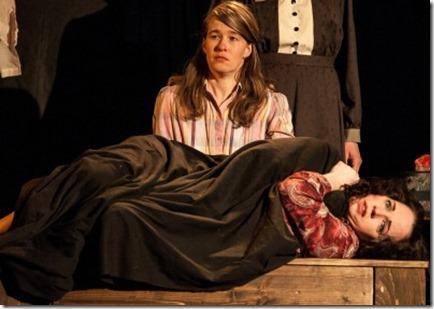
Having people embody elements of the house is an intriguing choice, but it doesn’t do anything to heighten the sense of malevolence that gradually engulfs the group under the good doctor’s supervision. Quite the opposite in fact. Some of the scariest moments from the book become almost comic on stage as Johnson and Willis crouch, grimace and scuttle through the story.
That story centers on Eleanor (Julia Kessler), whose participation in Dr. Montague’s study serves as a personal victory over a lifetime of being bullied by her tyrannical mother and selfish sister. Tellingly, costume designer Tom Kieffer has Kessler don a scarlet cardigan shortly after escaping her oppressive family, an apparel choice that vividly shows Eleanor overcoming her lifelong mousiness.
Eleanor is joined at Hill House by the melodramatic siren Theodora (Mary Anne Bowman, radiant as a self-made, larger-than-life diva who fully expects to be the center of attention everywhere she goes) and Luke (Charlie Rasmann), the been-there-done-that sophisticate who stands to inherit the house. But the most intriguing presence in this sinister slumber party is Dr. Montague’s wife (Elaine Carlson), a woman with a gift for conducting séances. Carlson is terrific in the role, a garrulous mix of goofy, ghost-friendly chatter and a subtly disturbing penchant for blithely rapping on dangerous doors.
The most effective work in The Haunting of Hill House comes not from the people on stage but from the crazed booms, crashes and disembodied laughter of Edwards ‘ sonic backdrop. The bumps in the night here are monstrous and disquieting, the audio expression of evil forces at work.
As The Haunting.. winds on, it becomes a study in psychological unraveling, a portrait of people driven to madness by things they can’t even see, much less understand. And therein lies the core of Jackson’s hair-raising novel. The true scares here aren’t from the eventual revelations of the house’s macabre, tragic history. They’re from the idea that something outside you, something uncontrollable, can make your mind turn on itself and lure you to an evil beyond the point of no return. Rationality surrenders to insanity. Malignancy engulfs goodness. Hearts break, minds warp, souls become lost, and life becomes suicide as the monsters within are the last vestiges of sanity (“Why don’t they stop me?”) flicker and die.
City Lit captures intermittent shades of Jackson’s masterful nightmare. Tone down the campish humor and dial up the psychological terror, and they’d have something truly scary on stage.
Rating: ★★½
The Haunting of Hill House continues through May 11th at City Lit Theater, 1020 W. Bryn Mawr (map), with performances Thursdays and Saturdays at 7:30pm, Sundays 2pm. Tickets are $25-$29, and are available by phone (773-293-3682) or online through BrownPaperTickets.com (check for half-price tickets at Goldstar.com). More information at CityLit.org. (Running time: 2 hours 15 minutes, includes an intermission)
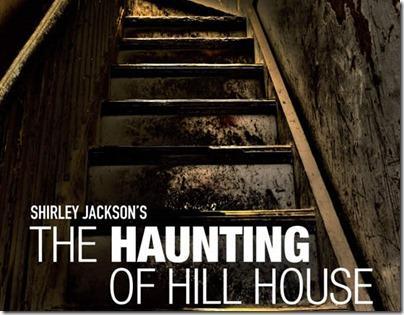
Photos by Austin D. Oie
artists
cast
Mary Anne Bowman, Elaine Carlson, Kingsley Day, Evan Johnson, Julia Kessler, Edward Kuffert, Charlie Rasmann, Sheila Willis
behind the scenes
Paul Edwards (adaptor, director, sound design), Dustin Pettegrew (set design), Devin Carroll (lighting design), Tom Kieffer (costume design), Alexa Berkowitz (stage manager, assistant director), Lisa Maraldi (graphic design), Austin D. Oie (photos)
14-0366

